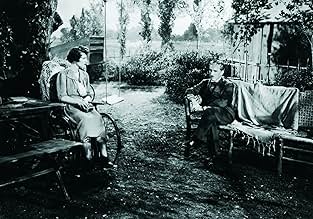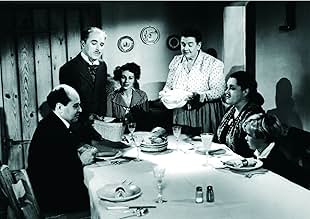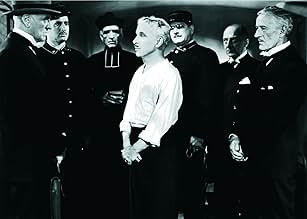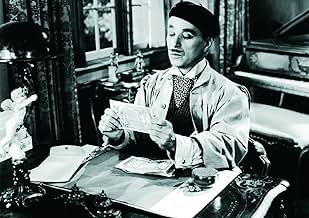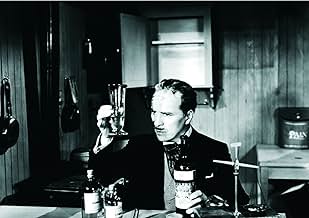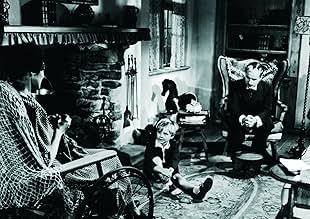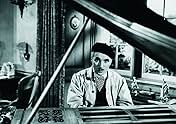IMDb-BEWERTUNG
7,8/10
19.660
IHRE BEWERTUNG
Ein freundlicher aber zynischer Mann unterstützt seine Familie, indem er reiche Frauen heiratet und ermordet; der Job birgt jedoch einige Berufsrisiken.Ein freundlicher aber zynischer Mann unterstützt seine Familie, indem er reiche Frauen heiratet und ermordet; der Job birgt jedoch einige Berufsrisiken.Ein freundlicher aber zynischer Mann unterstützt seine Familie, indem er reiche Frauen heiratet und ermordet; der Job birgt jedoch einige Berufsrisiken.
- Für 1 Oscar nominiert
- 5 Gewinne & 1 Nominierung insgesamt
Ada May
- Annette - Her Maid
- (as Ada-May)
Bernard Nedell
- Prefect of Police
- (as Bernard J. Nedell)
Handlung
WUSSTEST DU SCHON:
- WissenswertesVerdoux's quote "One murder makes a villain; millions a hero" is taken from the abolitionist Bishop Beilby Porteus (1731-1808).
- PatzerAlthough the story takes place in the years 1932-1937, all the women's fashions and hairstyles are of the 1946-1947 styles, when the film was made.
- Zitate
Henri Verdoux: Wars, conflict - it's all business. One murder makes a villain; millions, a hero. Numbers sanctify, my good fellow!
- Alternative VersionenThe West German theatrical version was cut by approximately 15 minutes.
- VerbindungenFeatured in Schwer verliebt (2001)
Ausgewählte Rezension
Charlie Chaplin is "Monsieur Verdoux" in this 1947 film based on the real-life serial killer Henri Landru. Verdoux is a bank clerk who is laid off late in life and turns to marrying and killing women for their money in order to support his invalid wife and child. Sounds brutal, and when you think about it, it really is, but Chaplin as usual manages to couch his message in comedy. While we see that he is successful in knocking off a couple of women and getting their money (though we never actually see a murder), Verdoux has a couple of failures as well, and there the fun begins. One of his women, Annabella Bonheur, is played hysterically by Martha Raye as a vulgar loudmouth eternally suspicious of Verdoux, who is posing as a boat captain. He tries some different ways of killing her, but no matter what he does, nothing works. He then turns his attention to another woman he's been chasing for some time, Marie Grosnay (Isobel Elsom). He's about to walk down the aisle when who does he see as a guest at the wedding - Annabelle. His attempts to get out of the house are priceless.
Despite some genuinely comical scenes, the speech that Verdoux makes gives its deeper message - Verdoux was in it for the money. To him, the women were business propositions to be exploited. His point is that what he has done on a smaller scale is being done by dictators worldwide; people are not treated as human beings but merely for economic gain, for power and for exploitation. Though Verdoux's argument doesn't absolve him of responsibility or justify his actions, the warning is a good one - people need to care more about each other and about what's going on in their world, and put their attention on really important matters like suppression of the masses. Why, he asks, are the headlines full of Verdoux and not of what is going on around the world? (The film's ending takes place in 1937.) It's interesting to consider what would have happened to this story in the hands of Orson Welles, whose idea it was originally. He wouldn't have made it a comedy. It would have been a drama or a detective story. Only Chaplin would think of making the story of a serial killer into a comedy of sorts. Certainly 1967's "No Way to Treat a Lady" takes a page or so from this script.
"Monsieur Verdoux" wasn't well received by the public - at all - and by 1947, people were questioning Chaplin's politics instead of reveling in his genius. It possibly was ahead of its time; it certainly wasn't appreciated as it is today. The movie is not without some problems, the biggest one being, what the heck happened to Verdoux's wife and child? It is never explained.
"Wars, conflicts - it's all business. One murder makes a villain; millions a hero. Numbers sanctify." Charlie Chaplin as Verdoux said that 61 years ago.
Despite some genuinely comical scenes, the speech that Verdoux makes gives its deeper message - Verdoux was in it for the money. To him, the women were business propositions to be exploited. His point is that what he has done on a smaller scale is being done by dictators worldwide; people are not treated as human beings but merely for economic gain, for power and for exploitation. Though Verdoux's argument doesn't absolve him of responsibility or justify his actions, the warning is a good one - people need to care more about each other and about what's going on in their world, and put their attention on really important matters like suppression of the masses. Why, he asks, are the headlines full of Verdoux and not of what is going on around the world? (The film's ending takes place in 1937.) It's interesting to consider what would have happened to this story in the hands of Orson Welles, whose idea it was originally. He wouldn't have made it a comedy. It would have been a drama or a detective story. Only Chaplin would think of making the story of a serial killer into a comedy of sorts. Certainly 1967's "No Way to Treat a Lady" takes a page or so from this script.
"Monsieur Verdoux" wasn't well received by the public - at all - and by 1947, people were questioning Chaplin's politics instead of reveling in his genius. It possibly was ahead of its time; it certainly wasn't appreciated as it is today. The movie is not without some problems, the biggest one being, what the heck happened to Verdoux's wife and child? It is never explained.
"Wars, conflicts - it's all business. One murder makes a villain; millions a hero. Numbers sanctify." Charlie Chaplin as Verdoux said that 61 years ago.
Top-Auswahl
Melde dich zum Bewerten an und greife auf die Watchlist für personalisierte Empfehlungen zu.
- How long is Monsieur Verdoux?Powered by Alexa
Details
- Erscheinungsdatum
- Herkunftsland
- Offizielle Standorte
- Sprachen
- Auch bekannt als
- Monsieur Verdoux
- Drehorte
- Produktionsfirma
- Weitere beteiligte Unternehmen bei IMDbPro anzeigen
Box Office
- Budget
- 2.000.000 $ (geschätzt)
- Bruttoertrag in den USA und Kanada
- 64.636 $
- Weltweiter Bruttoertrag
- 65.718 $
- Laufzeit1 Stunde 50 Minuten
- Farbe
- Seitenverhältnis
- 1.37 : 1
Zu dieser Seite beitragen
Bearbeitung vorschlagen oder fehlenden Inhalt hinzufügen

Oberste Lücke
By what name was Der Heiratsschwindler von Paris (1947) officially released in India in English?
Antwort

